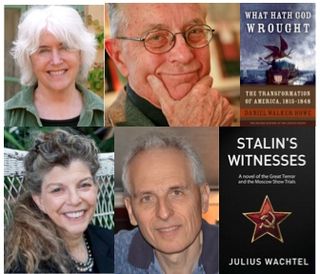
Michele Zack has settled into her place as a local independent historian, but then there’s an intersection she likes to explore: history and fiction.
“I’m kind of obsessed with this whole question of fiction and history and how all history is a bit of historical fiction and all fiction is historical,” Zack says.
She’s going to explore her obsession on Saturday along with writers who explore those boundaries -- and occasionally cross them -- at the second annual LitFest Pasadena, at Central Park.
About 40 years ago, Zack said, “E.L. Doctorow wrote Ragtime: it was a big ‘do that he took real historical characters and put them in a novel. But this is just so common now that nobody blinks. It’s happening more and more -- people consume their history through fiction.”
She cites Mary Coin by Marissa Silver, a novel that takes off from the classic Dorothea Lange dustbowl-era photo of migrant mother Florence Owens Thompson; and John Muir High School graduate Megan Marshall, with her historical novels of 19th century American feminists, The Peabody Sisters and Margaret Fuller.
Zack will lead a panel, “Are History and Fiction Converging?” with three authors who explore that penumbra: Daniel Walker Howe, 2009 Pulitzer Prize-winning historian; Mary Corey, a cultural historian teaching at UCLA who is working on a novel and assigns fiction to her history students; and Julius(Jay) Wachtel, a former federal agent-turned novelist.
“I have a great panel,” Zack says. Howe “is a great scholar, and has written for the most prestigious series on American History. What Hath God Wrought is a a doorstop -- I’ve read it twice, it’s about the history from 1815 to 1846, with revolutions in communication and the Second Great Awakening. He just sticks to the facts.”
Corry “is controversial, she’s a real firecracker: she writes a lot about the 1960’s -- she wanted to be a novelist, but got a Ph.D. in history.”
Wachtel “had a whole career in law enforcement at the Bureau of Alcohol, Tobacco, and Firearms, went on to get a Ph.D. in criminal justice. He teaches at Cal State Fullerton. He has an interesting biography: his family were Jews who escaped Europe -- his mother was in a concentration camp liberated by the Russians -- and they settled in South America. He emigrated when he was 10.
“He was really interested in the show trials that Stalin conducted -- how [Stalin] tried to get political justification for murdering his political enemies. He was trying to write his book, Stalin’s Witnesses, as a nonfiction book, but couldn’t find a publisher who wanted it as a piece of straight history. They asked, ‘Can’t you write a well-researched novel about it?’ So he did.”
Among the topics they will explore in the 45-minute discussion is the problem of fiction replacing hstory. As an example, she cites the film “Chinatown”: It’s set in the early 1930’s, but it conflates things that happened from 1908 to the 1930’s. It’s a great movie, there’s something so true about it, but it’s not history -- but parts of it are history.”
Zack’s panel is scheduled for 11:45 AM Saturday at the Julia Child Stage. Panels, speakers, and events will be going on all day for LitFest Pasadena.



